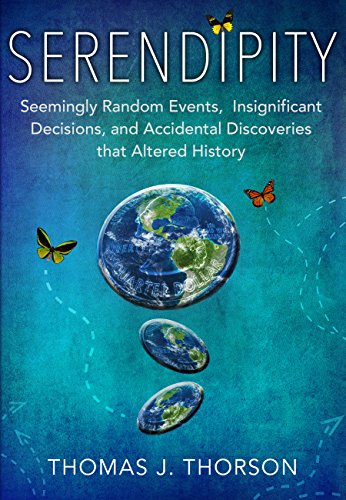Serendipity: Seemingly Random Events, Insignificant Decisions, and Accidental Discoveries that Altered History received a 4+ star review, making it an IndieReader Approved title.
Following find an interview with author Thomas J. Thorson.
What is the name of the book and when was it published?
Serendipity: Seemingly Random Events, Insignificant Decisions, and Accidental Discoveries that Altered History. Published November 2017
What’s the book’s first line?
“The British Empire was never so vast as in the Victorian period of the late nineteenth century.”
What’s the book about? Give us the “pitch”.
World history is replete with instances in which a critically important event would not have occurred but for the intervention of fortune. Was the very existence of Christianity saved first by the appearance of a meteor and later by the alcohol-induced death of a distant leader? Did millions of people die due to a chauffeur turning down the wrong street or the rejection of an art school applicant, and then were millions more saved due to a well-timed vacation? Did chance meetings change children’s literature forever and bring us The World’s Greatest Rock and Roll Band? What role did masturbation play in the development of Corn Flakes? Each chapter of Seredipity sets a pivotal event in its historical context and raises the question of how chance may have changed our world on both a global and personal level, with subjects ranging from movie stars discovered by accident to wars initiated or their course altered by happenstance.
What inspired you to write the book? A particular person? An event?
I’ve always been fascinated by the role chance plays in our lives, in particular as it pertains to interpersonal relations. Had the oddest and seemingly most insignificant choices or happenings never occurred, I would not have met my (now ex-) wife and had three wonderful children, or ended up with a new and invigorating relationship with the best friend I’ve ever had. Then one cold January as I was driving my daughter past endless cornfields on her way to her last semester of graduate school, we talked about the multiple random events and unusual choices that led to her choice of majors. That led to our exchange of stories about other such events that had a more historical significance. It was an interesting topic, and I thought there may be a book in there somewhere. As it turns out, there was.
What’s the main reason someone should really read this book?
It’s a great stimulant to thinking back on one’s own life and the little, seemingly meaningless things that ended up changing everything. It’s also a fascinating way to visit various times in history when serendipity changed the world, for better or worse, and to see the context for each event. It’s educational without being academic and simply a fun read.
When did you first decide to become an author?
Is it self-explanatory to say that I was an English major in college? Try to find one that hasn’t always dreamed of writing the Great American Novel. This isn’t it, but it’s extremely satisfying to put something out of which I’m proud and that will survive after I’m gone.
Is this the first book you’ve written?
The first one I’ve seen through and published. Do we count the hundreds of beginnings that were mercifully never pursued to the end?
What do you do for work when you’re not writing?
Outside of writing I’m a boring attorney with a focus on real estate transactions. I am also in the process of starting up an ice cream catering business featuring my own homemade ice cream (60 flavors and counting) as well as sauces, cookies and ice cream sandwiches.
What’s a great piece of advice that you can share with fellow indie authors?
Write for yourself, never for others. And ignore the advice of other authors, including me.
Would you go traditional if a publisher came calling? If so, why?
Maybe. It would be hard to turn down the chance for a fleeting moment of fame, but I’m pretty stubborn and I don’t know if I could stand the pain of turning over certain editorial decisions to a third party.
Is there something in particular that motivates you (fame? fortune? more sex?)
Wait, sex is an option here? Is it too late to change my answer from “my ego” to “more sex?” And how exactly does that work?
Which writer, living or dead, do you most admire?
I’ve always admired William Faulkner, who captured the mood of the South like no one before him. Overall, though, I have to give it to Rex Stout. His characters are memorable and the beautiful simplicity of his prose is something that I can read over and over. The fact that he wrote each story and novel from beginning to end without a single change or edit, and that he was able to wrap up the Nero Wolfe series just before he died after decades, is amazing.

